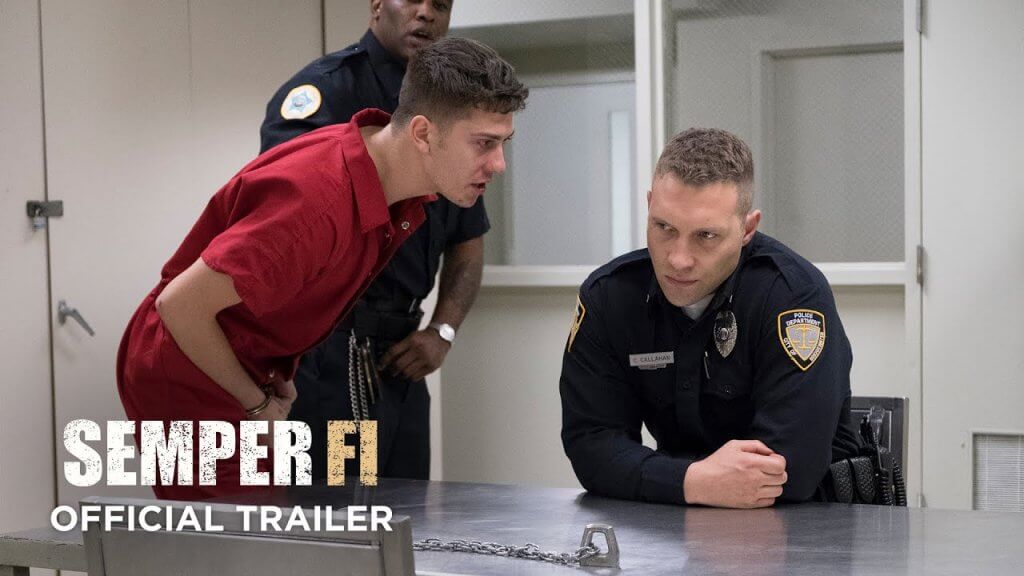A new movie explores the unique bonds that emerge on and off the battlefield.
“Semper Fi” highlights the journey of a group of Marine reservists whose friendship causes them to make sacrifices beyond the battlefield. It premiered this month in select theaters and is also available digitally.
“Semper Fi” is all about brotherhood. Not only does it focus on two characters who are brothers, but it portrays the tight bonds of friendship among a group of Marine reservists.
Why did you make this a central theme of the movie?
Mullin: The unique bonds that are formed among the military are something people hear about but don’t see all the time. The bonds that these guys share are some of the most unique bonds made between humans. I’ve met people with lots of money and power, but the richest people I know are the ones with bonds like these.
They have each other’s backs. At their lowest point, they are all there for each other. The plan was not to explore PTSD, but to explore the struggle with morality in combat. [One character] kills someone in combat, while his brother kills someone by accident. He is a celebrated war hero while his brother is in jail. He is struggling to find a way to balance that moral discrepancy, and the only way he can see forward is by freeing his brother from jail. We wanted to tell a moral balancing act story of being a service member and a civilian.
This film is a unique look at the life of reservists, both in their training environment and in their regular jobs and down time. Why did you focus on reservists?
Mullin: We wanted to remind viewers that not all service members are full-time. Not everyone who has been called up to fight these wars is a full-time soldier. When the script was being developed in 2005-2006, the reservists were just beginning to get called up to Iraq. Many people have warring commitments of family and jobs. We wanted to show the strains that families and all these reservists go through. When writing the jail-break scene, we wanted someone to back out because of family commitments.
Tell us about your own military experience, and how it led to your career in screenwriting.
Mullin: I graduated West Point in 1997 and became an artillery officer. I was assigned to 1st Infantry Division in Germany and was there in the late 90’s, which was essentially peacetime. There was a special program called Army Combat Reform Initiative to get active-duty officers to transfer to the National Guard. When I was approved, I chose New York and drilled in Manhattan. I was the plans officer in charge of operations. It was still just one weekend a month, two weeks a year. Around that time, I started doing standup comedy and improv. Then I started taking screenwriting classes and loved that. I wanted to focus on creative pursuits.
And then we were attacked on Sept 11. I got my wife safe, then got into uniform and spent the next two weeks working intensely at the Ground Zero site. We were tasked with moving body parts to the morgues. I worked full-time with the Guard from January to August 2002. They had to make up a title: Capt. Mullin, New York City Street Force Commander. I would check the bridges and tunnels and monitor progress at Ground Zero.
Working at Ground Zero led me even further in the direction of becoming an artist. You definitely realize how short life can be. I had wanted to apply to grad school in film at Columbia, but I didn’t have a film background and felt insecure. I realized art is a way of being immortal. I was accepted into the graduate film program at Columbia University in summer 2002, when the National Guard unit was drawing down. I had completed my five-year commitment from West Point, so I resigned to go to grad school.
Why did an Army National Guard Soldier write this script about a group of Marine reservists?
Mullin: Henry Alex Rubin [the other co-writer] came up with the initial concept for the film. Henry was adamant about it being about Marines. He was also adamant about teaming up with a writer who was a veteran. He had done undergraduate work at Columbia, and I was in the Film MFA program at Columbia. I had written a screenplay about brothers playing rugby at West Point. He liked my screenplay, so we wrote the first draft of “Semper Fi” together in 2005.
The characters have Marine uniforms, phrases, and attitudes. Did you have to research to learn details about the Marine Corps?
Mullin: I had to do a lot of research. When I transferred from active duty to National Guard, it was a shift being surrounded by soldiers who were primarily cops and subway workers. That experience made me familiar with the weekend warrior concept. Even though I come from a military background, it was important to get a certain level of authenticity. Our main consultant is a Marine Corps veteran named Rudy Reyes. Reyes helped run a boot camp with the actors. He’s so good we gave him a cameo appearance in the film! He yells at a Marine to wear his cover.
Now that you have transitioned from the military to the film industry, do you see overlapping skills in both fields?
Mullin: People think the military and film are two completely separate worlds, but I think they’re very similar — both have the paramount importance of leadership, the extreme hierarchy. There is a creative element in the film industry, but you still need to be diplomatic with different types of characters and people who disagree. Both industries demand the ability to adapt and overcome, perseverance, and the ability to be calm under pressure. Me being a logistics officer definitely helps in the organization process for developing a film.
“Semper Fi” is available now on Amazon.

